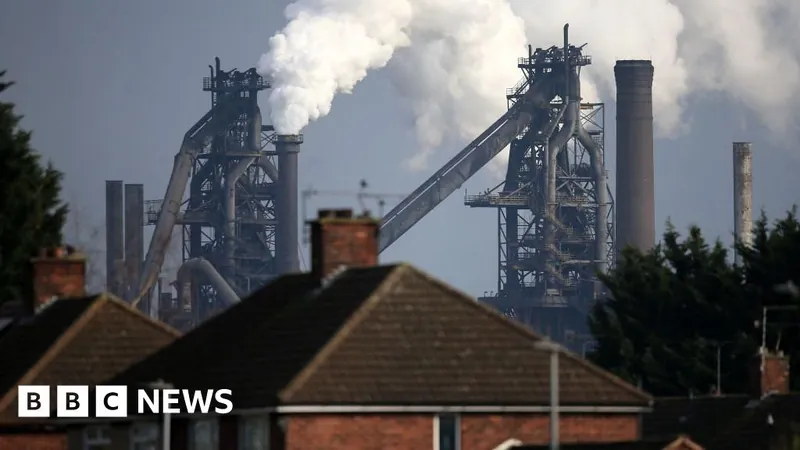
UK Government Steps In to Save British Steel: What You Need to Know
2025-04-13
Author: Ken Lee
Government Takes Control Amid Crisis
In a dramatic move, the UK government has seized control of British Steel’s Scunthorpe plant to avert an imminent closure. This intervention follows concerns over the plant's diminishing operations, which employ about 2,700 workers—75% of the company’s total workforce.
The Importance of British Steel
British Steel’s Scunthorpe facility is the last in the UK capable of producing virgin steel, crucial for major construction projects. With two operational blast furnaces, it creates steel with fewer imperfections compared to recycled sources. If it were to shutter, the UK would join the ranks of G7 nations unable to produce its own virgin steel, jeopardizing the nation’s economic security.
Ownership and Nationalization Confusion
British Steel was originally formed in 2016 after Tata Steel sold its struggling division to Greybull Capital for a mere £1. After experiencing financial turmoil, the company fell into the hands of the government’s insolvency service in 2019, later being acquired by Chinese firm Jingye. In light of recent losses approximating £700,000 a day, talks between the government and Jingye faltered, prompting emergency legislation to grant the government control.
Why Did the Government Act?
With supplies like coking coal and iron pellets dwindling, urgency mounted as shutting down the blast furnace would make restarting it an arduous and costly endeavor. Unions warned that the plant was nearing a cliff-edge scenario, necessitating the government to step in, especially after Jingye rejected initial offers to purchase necessary materials.
Financial Woes of the Steel Industry
Jingye has pointed to a combination of harsh market conditions, tariffs, and transition costs to greener production as the reason for the plant’s dire financial state. UK steel production has been on a decline for decades, exacerbated by global overproduction leading to lower prices and rising electricity costs for British manufacturers.
The Broader UK Steel Landscape
The UK steel industry comprises over 1,160 businesses that support approximately 40,000 other firms. Once the country's largest producer, Tata Steel at Port Talbot is also facing challenges, having recently ceased operations at its blast furnace. Meanwhile, other players like Liberty Steel and Celsa are grappling with rising operational costs, further complicating the industry landscape.
Future Uncertain but Government Hopeful
The new emergency law allows the government to order the necessary materials to sustain production and ensures that any employees let go by Jingye can be reinstated. While the government is keen on attracting private investment to keep the plant afloat, no prospective buyers have emerged as of yet.





 Brasil (PT)
Brasil (PT)
 Canada (EN)
Canada (EN)
 Chile (ES)
Chile (ES)
 Česko (CS)
Česko (CS)
 대한민국 (KO)
대한민국 (KO)
 España (ES)
España (ES)
 France (FR)
France (FR)
 Hong Kong (EN)
Hong Kong (EN)
 Italia (IT)
Italia (IT)
 日本 (JA)
日本 (JA)
 Magyarország (HU)
Magyarország (HU)
 Norge (NO)
Norge (NO)
 Polska (PL)
Polska (PL)
 Schweiz (DE)
Schweiz (DE)
 Singapore (EN)
Singapore (EN)
 Sverige (SV)
Sverige (SV)
 Suomi (FI)
Suomi (FI)
 Türkiye (TR)
Türkiye (TR)
 الإمارات العربية المتحدة (AR)
الإمارات العربية المتحدة (AR)